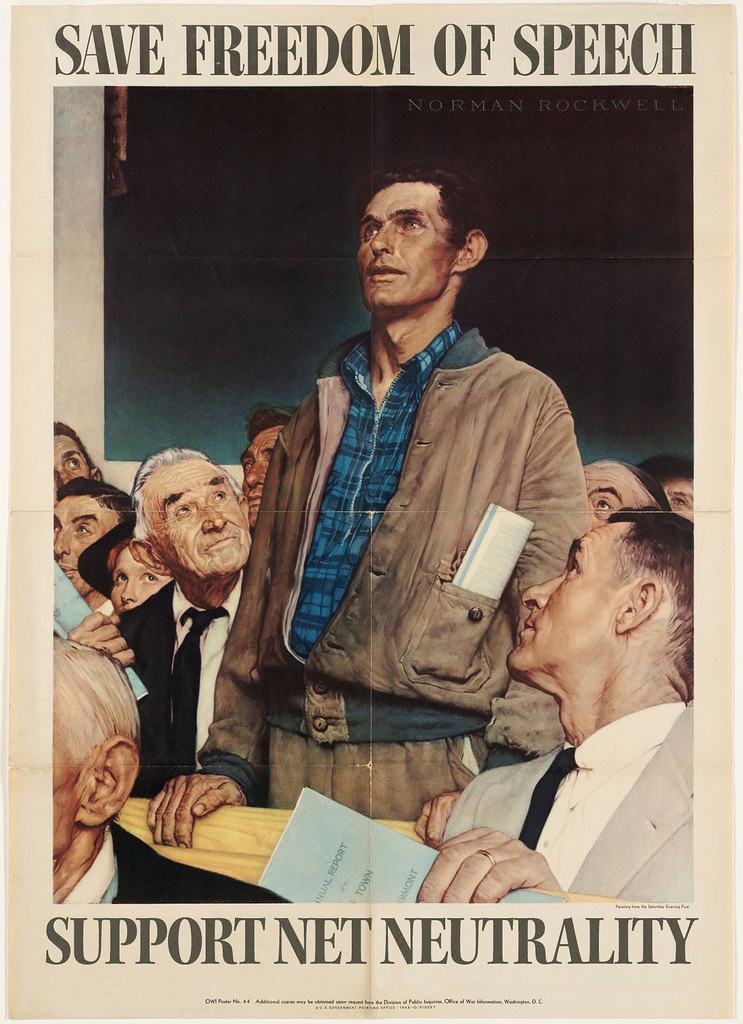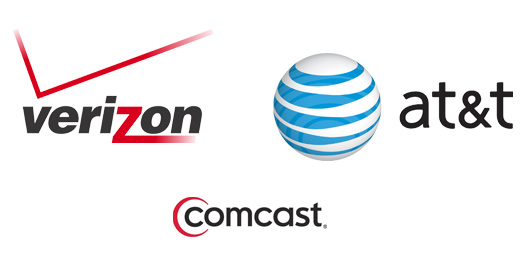The Future of the Internet: Net Neutrality

Currently, US law states that the telcos and the government that provide broadband services are not allowed to impose any restrictions on the Internet content that they deliver. When the Communications Act was passed in 1934, the Federal Communications Commission (FCC) was given the right to regulate telephone companies as common carriers. Under this legislation, telephone companies became subject to regulations that prevent discrimination based on content. In the 1970’s and 80’s, telephone networks were made available to Internet service providers (ISPs) under a non-discriminatory status, expanding the Communications Act to encompass the Internet as well. Since then, net neutrality has been founded on three main principles designed to foster a rich and prosperous Internet community.

First, ISPs do not have the right to directly influence the distribution of information on the Internet. This prevents telcos from censoring information they dislike or slowing down websites with objectives and philosophies that oppose their own views. For example, lack of anti-discrimination laws would mean that an ISP could slow down or block worker unions’ websites that are lawfully protesting that company’s policies. If such actions were to be allowed, they would have a profound impact on our First Amendment right, freedom of speech.
Second, telcos are prevented from stifling online competition. Without such a principle, ISPs would effectively have the ability to give preferential treatment to its own services over that of its competitors, monopolizing an industry already dominated by a few companies. The situation would be analogous to selecting the companies that would be allowed to compete and those that wouldn’t! Imagine if Google had started without such a principle. It could not have grown to be the company it is today if it were in an environment so hostile to small businesses, such that would arise without neutrality laws.
Lastly, service providers are prevented from having control over equipment and platforms used for viewing and sharing information on the web. For example, routers are now a staple part of wireless Internet in the home. Telcos are prevented from barring other companies from manufacturing and distributing routers to access the provider’s network. Without such a restriction, users would be forced to buy equipment manufactured by their service provider to the exclusion of better equipment manufactured by a different company. The public would feel the impact as equipment would cost more and there would be fewer options available.
All three of these principles hit on a similar theme: the Internet is a medium for the expression of free speech. The idea that an entity could control and censor information at will violates essential freedom of speech rights and sets a precedent for such entities to impose their own agendas. Therefore, users should have the right to access and post content of their choice, both of which are essential to a diverse marketplace.
In recent months, net neutrality has resurfaced as a hot button issue due to FCC chairman Julius Genachowski’s decision to preserve the categorization of broadband access as a telecommunications service. This means the chairman supports neutrality law, and is even considering expanding on it to make it stronger. Major Internet-based companies like Google Inc., Amazon Inc., and Skype Ltd support the proposition, as do consumer and civil liberties watch-groups such as the American Civil Liberties Union (ACLU). Microsoft has previously come out in support of net neutrality; however, the company has since backtracked and adopted a lukewarm position. The same goes for Apple, whose tightly controlled app store and extensive relationship with AT&T have raised questions about its commitment to stronger neutrality law. Telcos, on the other hand, are very vocal about their opposition to current policy, opting for less regulation. While the latest statements from the chairman are positive, his stance on the issue has been wavering over the past several months due to mounting pressure from the telecommunications industry, spending millions of dollars to lobby against strong rules and regulations.
In 2009 alone, AT&T, Comcast, Verizon, and The National Cable & Telecommunications Association collectively spent $61 million on an army of close to 500 lobbyists to kill current neutrality law. The industry has been trying to lobby Congress through generous campaign contributions, misleading advertising, fake grassroots organizations, and offering well paid lobbying positions to current congressional staffers and aides if they influence policy decisions. Other industries have been lobbying Congress in similar ways. For example, the healthcare insurance industry is similar to the telecom industry, spending millions of dollars to stifle competition that would bring choice to consumers. While the amount of money telecos have spent may seem high, it pales in comparison to their potential profit margins if strong neutrality laws were to be repealed. In order to hide this clear monetary incentive for opposing neutrality law, ISPs publicly oppose net neutrality on ideological pretenses instead.

The opponents of net neutrality argue for a free-market approach over regulating ISPs, because many feel that the industry, like oil, finance, and healthcare, is most innovative when left unchecked and unregulated. Verizon, AT&T, and Comcast all argue that they must be allowed to provide a tiered system of service in order to foster innovation on the web. Under their proposed system, websites would have to pay providers extra for faster and more reliable service, meaning that sites with more capital would be faster, while smaller, poorer sites would be slower. Consumers would essentially be paying more to the provider but receiving less reliable content. Verizon argues that prioritizing bandwidth for transferring information is necessary for future growth on the Internet and that keeping the net neutral would create many inefficiencies. For example, in the area of telemedicine, Verizon says it would need to prioritize packets transmitting medical information as opposed to ones transmitting email. While this may seem like a reasonable point, it fails to establish any fine line between faster transfer of information based on medical necessity and faster transfer based on economic advantage.
The truth of the matter is that ISPs would rather spend money fighting regulations than providing a better customer experience. It’s almost laughable when they claim that more innovation result from deregulation. The industry has been given the chance to innovate. In the 90’s, ISPs received funding through government grants and tax breaks in order to make significant improvements to the infrastructure. They have yet to meet the speed and penetration standards originally mandated since receiving this public funding, and the result has been a lag in U.S. Internet speeds internationally: the U.S. is currently ranked 26th in the world for its broadband infrastructure. With the exception of Verizon, the industry has barely invested in fiber optic technology, which is cheaper and much more effective than conventional network cables. Even Google has initiated what ISPs have failed to deliver, with its experimental 1 Gbps fiber optic network that it plans to test in about 50,000 communities, affecting up to 500, 000 people.
Instead of making such important investments in future infrastructure, ISPs are trying to find other ways to “innovate.” For example, ISPs have found it profitable to gather customer Internet usage trends and secretly insert specific ads into other company’s web pages. Such actions cast serious doubts over user privacy online where the ISPs are using these “Big Brother” methods. In addition to inserting ads, ISPs have been redirecting users to ads in order to maximize profits. For example, when a user types in a wrong URL, the ISP will often redirect the user to ad pages that pose major security risks. This unwillingness to incorporate intelligent and safe network protocols has given rise to new network security services like OpenDNS. Such services wouldn’t be necessary if providers focused on making their networks handle user input intelligently as opposed to making a quick buck through ad redirections. ISPs have also been caught using questionable methods trying to clamp down on peer-to-peer file sharing. In early 2008, Comcast settled a class-action lawsuit for $16 million where it was found to have been blocking or slowing down packets being sent through peer to peer (p2p) clients such as BitTorrent to reduce network congestion, even though they had no way of determining what data was being transferred, be it legally or illegally.
Even with current law, ISPs have already demonstrated that they are willing to slow down or block certain content unbeknownst to the consumer, raising questions about their potential actions in the absence of strong regulations. With content such as social media, entertainment, and news transitioning to online platforms, it is certainly a scary proposition to have a few large companies meticulously controlling the Internet for their own financial purposes. It is certain that such control will affect the average person’s Internet use, since high volume services like Youtube, Hulu, and Google will be the primary targets for ISP’s secretive “traffic management” techniques. Not only would these online services be under control, but many of the physical services providing us Internet access could be as well. The example given previously about routers is only at the tip of the problem, as we could see innovative Internet devices leave the realm of possibility due to network restrictions imposed by providers.
It is also important to note the political consequences of this change, as the web over the past six years has shed an enormous amount of truthful facts and information about political issues and campaigns. Online journalism, blogging, and Youtube have brought fact and reality to conversations outside of the Washington media bubble, giving people more choices for where and how they receive their information and news. Who’s to say that ISPs wouldn’t protect their political backers by blocking negative press about them over the web if net neutrality were to be repealed, the only thing that would be able to keep them from doing this? With these issues in mind and the fact that telecom companies are already abusing basic civil liberties, how can we trust that they will behave after they’re given even more control over the Internet and its content?
It is in the interest of the public to advocate for a fair and neutral Internet. The Internet has provided us with a means to hear all sides of an issue, something that is essential to a successful democracy in which diversity of opinion and rigorous debate help us solve problems within society. The filtering of information to suit the profit-based motives of a few companies will be disastrous for all. Imagine if oil companies bought out higher tier services and were able to broadcast their views more forcefully, while environmental and alternative energy groups were censored. Would the debate on the need to invest in cleaner and alternative sources of energy be a fair one?
Telcos have not only demonstrated complacency when it comes to the rights of the consumer, but have done so in efforts to make more profits. Spending millions in opposition to neutrality law instead of providing better services, it is clear that they do not have the public’s best interests in mind. A situation where telcos are given full liberties as gatekeepers of the Internet would kill any idea of unfiltered information. Therefore, consumers must be given options, especially when it concerns the information they receive. The right to view any content, choose any equipment, and compete with other services on a level playing field are essential to a free and innovative marketplace. Net neutrality thus serves as the line in the sand, and ensures that the Internet is not a controlled medium, but rather a means for uncensored communication, real reform, and progress.
Links: Save The Internet